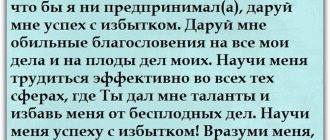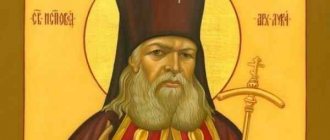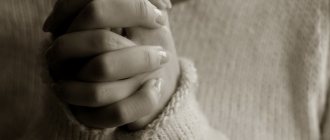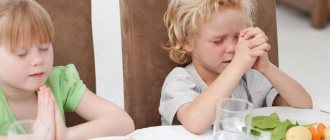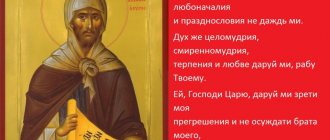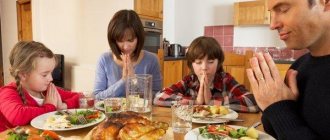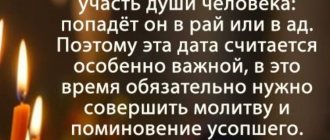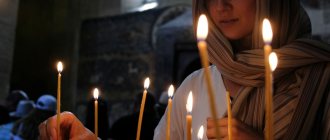- 697
- 10-09-2018
- Author: Mysekret Team
- 0
The rule “Not by bread alone...” is often forgotten, especially when it comes to prayer before meals. But most religions of the world include the need to say prayers before and after meals. This way, respect for higher powers is emphasized for the grace sent down and gluttony is denied.
What does Orthodox prayer do before and after meals?
To the question of Christians about what prayer before meals gives, the holy elder Seraphim Vyritsky answered. He said that a person is inclined to think about the need for prayer when he gets sick. But in vain - we need prayer every day. After all, we often don’t prepare food ourselves, but buy it already prepared. And no one knows how it was prepared. Perhaps the cook or baker was in a bad mood, he swore and said curses, and all this is transmitted with the food to those who ate it. But with prayer, curses do not work.
After eating, prayer is needed to thank the Lord for the food sent to you.
PORTAL CONTACTS
Answered by Hieromonk Dorofey (Baranov), resident of the Spaso-Preobrazhensky Monastery in Saratov
What is artos and how should it be consumed?
Artos is a specially prepared church bread that looks like a large prosphora. The meaning of this bread for Christians is determined by the very rite of its consecration. At the end of the night Easter service, an artos is placed in front of the royal doors, incense is performed, the priest reads a special prayer for the consecration of the artos and sprinkles it with holy water “in honor, and glory, and in remembrance of the Resurrection” of our Lord Jesus Christ.
Artos is not just dedicated to the Lord, but marks the invisible presence of Christ Himself among those praying. This custom has been preserved in the Church since apostolic times, when after the Ascension of Jesus Christ the apostles, gathering for a common meal, left the central place empty and placed bread in front of it, clearly expressing faith in the words of the Savior: where two or three are gathered in My name, there I am in the midst them (Matthew 18:20).
Also, in the prayer for the consecration of the artos, the priest, calling on God’s blessing on the artos, asks the Lord to heal ailments and to grant health to those who partake of the holy artos. Throughout Bright Week, the artos remains in front of the Royal Doors of the altar and is worn daily during Easter religious processions. On Bright Saturday, as well as on the first Sunday after Easter, which is called Antipascha, after the liturgy, the artos is crushed and distributed to the believers.
The use of artos, which is a symbol of the most essential bread for us - Christ the Savior, should be a rule of piety for a Christian. Artos is a shrine, and along with Epiphany water - agiasma, it is a beneficial aid during times of physical and mental ailments. Having brought artos home, you need to store it with reverence in the same way as prosphora: after drying, put it in a box or jar, place it under icons or in a clean place and eat it on an empty stomach, washed down with holy water, if necessary.
You just need to remember that the most important thing in the life of a Christian - the communion of the Holy Mysteries of Christ - neither artos nor baptismal water can replace.
Is it true that morning and evening prayers are not read during Bright Week (and when should they be read again)? How to prepare for Communion on Svetlaya? Is it possible to receive communion daily?
Bright Week is a very special time in the liturgical life of the Church, as well as in the everyday life of Christians. Repeated repetition at services of words about Christ’s victory over death seems to plunge a person into a state of joyful excitement, which in a sense even prevents one from concentrating on anything else. “Now everything is filled with light, heaven and earth and the underworld: let all creation celebrate the rebellion of Christ, in which it is established,” is the troparion of the Easter canon, which is sung every evening during Bright Week.
The morning and evening prayers read by Christians throughout the year are filled with more repentant feelings, requests for the forgiveness of sins and the sending of strength for the daily struggle with passions and temptations. These feelings, common for those who try to live a spiritual life, do not disappear anywhere at Easter, but the light of the Resurrection of Christ fills everything - “heaven, earth, and hell.” That is why the Church postpones these penitential prayers for a while and invites Christians to glorify Christ’s victory over death in home prayer.
Starting from Monday of Bright Week until the morning of Bright Saturday inclusive, instead of evening and morning prayers, the “Hours of Easter” are read, and instead of the rule for communion, the Easter canon and the stichera of Easter (all these Easter prayers are in the prayer books) and the procedure for Holy Communion (canon and prayers to Communion). If a person wants to prepare for Communion on the first Sunday after Easter, then the prescribed three canons, morning and evening prayers and following to Communion are already read.
As for fasting before communion on Bright Week, despite the statutory instructions on its abolition, generally accepted practice still recommends fasting for one day. This is not a violation of the rules, but a necessary preparatory ascetic measure, especially for those who receive communion irregularly.
Regarding daily communion on Bright Week, everyone must resolve this issue with their confessor. It depends on the degree of church membership of a person, his lifestyle and many other reasons. To receive communion on Bright Week during the liturgy celebrated according to the Paschal rite would be useful for a closer connection to the Paschal joy.
Why are the prayers “To the Heavenly King” and “It is worthy to eat” not read after Easter? And what prayers should you read before eating?
Bright Week makes changes to the external rules of piety, without diminishing them, but as if giving us the opportunity to feel at least a little the words of Christ: “I no longer call you slaves, for the slave does not know what his master is doing; but I have called you friends, because I have told you everything that I have heard from My Father” (John 15:15). For example, all bows to the ground are cancelled, both in church and during home prayer. This does not mean that we are not ready to bow before the Lord, but it reminds us of the kind of fellowship with Him we are called to.
At the beginning of all prayers in the period before Easter, the prayer “To the Heavenly King” is replaced by the triple “Christ is risen from the dead, trampling down death by death and giving life to those in the tombs.” This is due to the fact that, starting from Holy Week, we follow the gospel narrative and empathize with the apostles, the disciples of Christ. After the Resurrection, He appeared to the disciples many times, talked with them and gave instructions, one of which reads like this: Christ had to suffer and rise from the dead on the third day, and repentance and forgiveness of sins should be preached in His name to all nations, starting from Jerusalem. You are witnesses to this. And I will send the promise of My Father upon you; But you remain in the city of Jerusalem until you are endued with power from above (Luke 24:46-49). Here the Lord speaks about the coming descent of the Holy Spirit on the apostles and the birth of the Church of Christ. Therefore, in the period before Trinity, we, together with the apostles, do not call on the Holy Spirit: “come and dwell in us,” but we are, according to the word of the Lord, awaiting “endowment with power from above.”
At the end of all the prayers, as it should be on major holidays, instead of “It is worthy to eat,” the deserving man is read or sung, which on Easter is the irmos of the ninth song of the Easter canon: “Shine, shine, new Jerusalem...”. Also, the usual prayers before and after eating food are replaced by the threefold “Christ is risen from the dead...” and the worthy of Easter, respectively.
What Orthodox prayer should be read for the Exaltation of the Honest and Life-Giving Cross of the Lord?
On this day, September 27, the Orthodox Church celebrates the Exaltation of the Honest and Life-Giving Cross of the Lord. What does it mean? More than 300 years after the martyrdom of Jesus Christ, with the help of excavations headed by Empress Helena, the cross on which Christ died was found.
In the prayer before eating for the Exaltation, we remember this fact:
On the need for prayer
Prayer before eating food sets the right priorities in the human consciousness - the spiritual first, and the physical only later. By starting a meal in this way, a person protects himself from excessive appetite and puts his thoughts in order. A favorable mood contributes to good digestion of food, which has been proven by scientists.
Prayer before meals will protect a person from negative consequences. This simple action disciplines, teaches gratitude, spiritualizes matter, embodying the plans of the Spirit.
What Orthodox prayer should you read at the Presentation of the Lord?
According to the law of that time, parents had to bring their first-born sons to church on the 40th day after birth to dedicate them to God. Joseph and Mary brought their baby from Bethlehem to the Jerusalem Temple. In addition to the child, it was necessary to make a sacrifice, which became 2 doves. Here, in the temple, Elder Simeon, who was 300 years old, told Christ’s parents his further fate.
Prayer before meals on the Presentation of the Lord, February 15:
Prayer before meals - pharisaism or confession of faith?
In the life of every Orthodox Christian, sooner or later the question will arise: how to pray before eating if there are strangers around, perhaps far from Christianity? Everyone solves this problem in their own way. Some people pray silently, mentally crossing their food, some pray in a whisper, making the sign of the cross over their food, some don’t pray at all...
Many people are familiar with the feeling of embarrassment inside when trying to say a prayer before eating in a public place. We need to figure out where this confusion comes from and who are we afraid to confuse with our prayer? The answer suggests itself - prayer to God can only confuse demons. They tempt the people around you, pushing them into ridicule and indignation if you try to read a prayer in a public place.
“Prayer is the life of the human soul, its air and food. ... The necessary prerequisites for pure prayer are love, a kind heart, a collected mind, sincerity and consistency. Through prayer, a person partakes of Divine grace and is enlightened by Light. Prayer is an art that requires work, self-motivation, patience, and perseverance” (Reverend Paisius the Holy Mountain).
What Orthodox prayer should you read on Easter?
According to church custom, on Saturday evening, Orthodox people go to church, taking with them Easter cakes baked during the day, red-painted eggs, and other holiday dishes to dedicate. The Easter service lasts all night. In the morning, Orthodox Christians take the holy food home to eat at home after a long fast. Sitting down at the table, Christians remember that Easter supper, which Christ himself attended 1 day before his death, and ask Him to bless the food.
Prayer before eating on Easter with Easter cakes and an abundance of other food:
And if you don’t have money to cover the holiday table, modest food, what you have, should also be dedicated in church, and then read a prayer at home.
Prayer before meals on Easter, if the meal is meager:
Christian prayer of Ephraim the Syrian during Lent
Among other prayers of Lent, the prayer of Ephraim the Syrian is better known than others and is said daily, with the exception of Sunday and Saturday. This prayer of repentance is read both at services and at home. In a few short lines of appeal to God, the believer is asked to eradicate the spirit of idleness and idle talk in them and to grant them patience, chastity and love.
When and how is the prayer of Ephraim the Syrian read during Lent?
You should begin reading the prayer of Ephraim the Syrian on the evening of Forgiveness Resurrection before Lent. After asking for prayer, churchgoers bow and read the prayer “God, cleanse me, a sinner,” twelve times. In churches, the prayer of Ephraim the Syrian is read on Cheese Week on Wednesday and Friday, on Holy Pentecost and on Holy Week, on the first three days. The last time during Lent this prayer is said on Great Wednesday, four days before Easter.
Prayer of Ephraim the Syrian
Lord and Master of my life,
Do not give me the spirit of idleness, despondency, covetousness and idle talk.
Grant the spirit of chastity, humility, patience and love to me, Your servant.
Hey, Lord, King!
Grant me to see my sins,
And don't judge my brother
For blessed art thou unto the ages of ages.
Amen.
What Orthodox prayer should you read after eating?
If we go to church, then we are used to asking God for something: health, prosperity, a happy life. And we forget to give thanks for what the Lord gives us. But a true Christian should thank God every time he gets up after eating from the table.
All you need to do is read a short prayer after eating:
So, now we know what prayers need to be read before and after meals, on weekdays, and on major holidays.
Why bless food before eating?
The Church teaches that a parishioner who considers himself to be a true believer is obliged to sit at the refectory table and get up from it, having prayed twice. Words of thanksgiving, said before and after eating foods, are auxiliary to correctly accept the sacrifice of angelic love, which the food symbolizes. In order to emphasize the sacredness of the moment and fill it with religious meaning, a prayer is read before eating.
Appeal to higher powers during a meal is divided into:
See also...
✅ Weight loss spell
✅ Prayer before eating prosphora and holy water
✅ Spell for beauty in front of the mirror
✅ Tarot forecast for March 2021
- Prayer before meals - read “Our Father”, you can also read “Virgin Mother of God, rejoice...”;
- Prayer for blessing the products on the table;
- A prayer said at the end of the meal.
As you know, food is the source of life, but it is fraught with a number of dangers. The easiest way to succumb to the sin of gluttony. If you perceive food only as a means of obtaining pleasure, it will not bring maximum benefits . Spoiled or unhealthy foods also harm the body and depress the spirit. That is why it is important to pray before eating, asking the Almighty that the food will be beneficial, restoring not only the mortal shell, but also the spiritual content.
If a person is truly grateful for the food sent, he says the prayer with diligence and does not perceive it as a duty. Consecrated food is digested better and acquires a richer taste for those who consider it a gift from God.
When you make the sign of the cross over your food, you are signaling to heaven that you need a blessing. You need to cross yourself, from left to right. Shading should be done from the top and bottom of the table, as well as on the left and right sides.
Some believers pray additionally before preparing food. A short prayer such as:
“O Creator and Creator of all things, God, the works of our hands, which we begin for Your glory, hasten to correct with Your blessing, and deliver us from all evil, for One is Omnipotent and Lover of Mankind.”
If you want to protect yourself from intemperance while cooking, say the following prayer:
“Lord Jesus Christ, Only Begotten Son of the Beginningless Father! You declared with Your most pure lips that without Me you cannot do anything. For this reason, falling to Your goodness, we ask and pray to You, Your servant (name) and all those present here and praying to You, help in all their good deeds, their undertakings and their intentions. For Your power, kingdom and strength, all help is acceptable from You, we trust in You and send glory to You, with the Father and the Holy Spirit, now and ever and unto the ages of ages. Amen!"
Video: How to pray before eating if there are non-believers nearby?
We recommend reading about religious holidays:
- Dates of Orthodox and Catholic Easter 2022 - 2025
- “Provisions” or memorial days for Orthodox Christians
- Calendar of fasts, parental Saturdays and solid weeks in 2021
- Maslenitsa - the holiday of pancakes: traditions and rituals with pancakes
- What time does the morning, evening, Saturday, Sunday and night service in the church on weekdays and holidays begin and end?
Bright week. Holiday event
The church tradition of celebrating Easter for seven days has been established since apostolic times. The entire Bright Week is considered “as one day.” On Bright Week, every day, both in the morning and in the evening, divine services are supposed to be performed in church: believers should not engage in ordinary everyday chores at this time, but diligently remain in prayer in the temple of God, about which special instructions are given in the 66th rule 6- th Ecumenical Council:
From the Holy Resurrection of Christ our God today, until New Week, all week long it is fitting for the faithful to abide in the holy churches, psalms and praises and spiritual songs, joyfully celebrating, and listening to the veneration of the Divine Scripture, and enjoying the Holy Mysteries. Let us be side by side with Christ, co-resurrected and ascended. In the coming days, let them not do any kind of horse riding, or let them do any human disgrace (List 229, vol.). (1).
Bright week.
Illustration by Pavel Varunin The festive service during Bright Week is performed with the royal doors open: the open altar symbolizes in this case the image of the Holy Sepulcher, from which the angel rolled away the stone, as well as the opened entrance to the Kingdom of Heaven, which we gain thanks to the Redemptive Sacrifice and the Resurrection of Christ. All week long the festive bells are ringing, and all interested Christians are allowed into the bell tower and can ring at any time, as St. writes about this in his “Charter”. Arseny Uralsky : “those who wish can call at any time, and except for service” (2).
In a spiritual sense, Bright Week is for us a prototype of the future century and the endless joy of the General Resurrection in the Kingdom of Heaven, which we can enter if we worthily serve Christ God here, both in prayerful chants and in good deeds towards our neighbors, so that The holy Gospel promise is upon us:
Come, you blessed of My Father, inherit the Kingdom prepared for you from the foundation of the world (Matthew 25:34).
Sacred bread "arthus"
From the beginning of Bright Week, sacred bread called “artus” is placed in front of the royal doors. It symbolizes the “part of the Lord,” which the holy apostles placed at their table after the Resurrection of Christ, believing that the Lord is always invisibly present among them. The apostles left the central place at the table empty and placed their portion of the bread in front of it. Later, this custom became part of church services and was determined by the statutory order. At the end of the liturgy of Holy Saturday, the artus is crushed and distributed for consumption by those praying. Currently, this custom is preserved in parishes where there is an episcopal see.
Artus is also associated with the ancient church tradition that the apostles left part of the bread at the table for the Most Pure Mother of the Lord, as a reminder of constant communication with Her, and after the meal they reverently divided this part among themselves. In monasteries, this custom is called the “Rite of Panagia,” that is, the remembrance of the Most Holy Mother of the Lord. In parish churches, the bread of the Mother of God is remembered once a year when the artus is broken.


